Defence team says the court violated Egypt's criminal procedure law by not allowing its lawyers to speak during the session
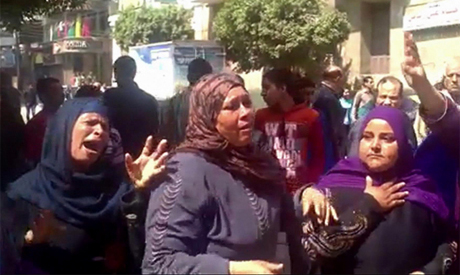
This image made from video shows relatives reacting after an Egyptian court on Monday sentenced to death 529 supporters of ousted Islamist President Mohammed Morsi in connection to an attack on a police station that killed a senior police officer in Minya, Egypt
A member of the defence team representing the 529 defendants handed a mass death penalty on Monday has said that his team will appeal the verdict, the largest of its kind in the history of Egypt's criminal courts.
Ahmed Shabib, a Muslim Brotherhood lawyer, said on Monday that defence lawyers would bring the appeal after receiving the reasoning behind the court's ruling.
Shabib added that he and his fellow lawyers would request a retrial for the defendants sentenced in absentia.
On Monday, an Upper Egyptian court in Minya sentenced 529 supporters of deposed president Mohamed Morsi to death on charges of murdering Mostafa El-Attar, deputy commander of the Matay district police station, who was killed during riots in the aftermath of the violent dispersal of two pro-Morsi sit-ins in August.

The court also acquitted 16 other defendants after it was proved that they had helped save another officer from being killed.
Only 147 defendants were present at the hearing. The remaining defendants have been released, set free on bail or still remain at large.
Shabib told Ahram Online that the 45-minute court session, held amid a heavy security presence, had not been attended by either the defendants or their defence team.

He added that a request to change the judge overseeing the case's first session on Saturday had been turned down by the court.
The defendants' papers will be handed over for inspection to the office of the Grand Mufti, the country's official authority for issuing religious edicts, as per Egyptian law which stipulates that all death sentences be reviewed by the Mufti for ratification.

The court has set 28 April as the date the final verdict will be issued.
Meanwhile, Mohamed Tosson, a Brotherhood leader and a member of the defence team, said that only 22 defendants are members of the Brotherhood.
Tosson further slammed the verdict as being “the fastest and most bizarre in the history of Egyptian judiciary.” He added that the judge did not grant time for the defence team to present its case, which he says is a violation of Egypt's criminal procedures law.

“This verdict is void under the criminal procedures law, under the penal code and under the recently ratified constitution,” said Tosson, adding that the verdict only aims to intimidate the Brotherhood.
A statement issued by the Brotherhood accused Egypt's interim authorities of using the judiciary to launch "a genocide" against protesters.

"These verdicts will only make the revolutionaries more determined to topple the coup," added the statement.
Monday’s sentence was criticised by the Lawyers' Syndicate, which announced that it would hold a press conference on Tuesday to clarify the violations present in the verdict.

A relative of a supporter of Egyptian ousted Islamist president Mohamed Morsi cries outside the courthouse on March 24, 2014 in the central Egyptian city of Minya, after the court ordered the execution of 529 Morsi supporters after only two hearings
Minya death sentences ‘unconstitutional and illegal’: Defence lawyer
Court procedures questioned as 529 referred to Grand Mufti for opinion on death sentence
The Minya Criminal Court has referred 529 Muslim Brotherhood supporters to Grand Mufti Shawqy Allam, who will provide his opinion on whether or not they should be sentenced to death for attacking a police station, which resulted in the death of one policeman last year.
“This is unprecedented; I have worked as a lawyer for 25 years. I have never seen a case that concludes after three days, said Gamal Abdul Hamid, one of the defence lawyers in the trial.

Abdul Hamid confirmed to Daily News Egypt that the lawyers for the defence were prevented from entering the court to hear the judge’s decision in Monday’s session. He also confirmed that 18 people were acquitted in the trial, adding that 124 defendants were present in court on Monday.
The lawyer stated that the first session of the trial, which involved 547 defendants, was carried out according to procedure on Saturday.

“One of the other lawyers requested for the judge to recuse himself,” Abdul Hamid said, adding that the other defence lawyers stood in solidarity with this request, but noted that the judge’s attitude changed. “He adjourned the session and announced that a decision would be issued on Monday,” said the lawyer.
Neither the defence nor the prosecution presented their arguments, said Abdul Hamid. He decried the decision by the court as “unconstitutional and illegal”.

Hafez Abu Saada, head of the Egyptian Organisation for Human Rights and member of the National Council for Human rights, said he is “astonished” at the verdict. “This is the first time in Egyptian judicial history that more than 500 are referred to the death penalty.” He said the decision is a result of what he believes to have been “very illegal proceedings”.

Abu Saada explained that Allam’s decision is not final, but is instead an opinion that will be given to the Minya Criminal Court to decide on a final verdict. The lawyers and the defendants will then have the opportunity to appeal the verdict with the Court of Cassation. If the appeal is accepted the trial will be heard again in the Minya Criminal Court by a different judge.
The Grand Mufti’s opinion must be received by the court by the next session of the trial, which is scheduled for 28 April.
The Muslim Brotherhood described Monday’s decision as “shocking and unprecedented”, adding that the trial was “without due process” and “is inhumane and a clear violation of all norms of humane and legal justice”. The group said it would “take all legal actions to appeal the court ruling and defend basic rights of Egyptians”.

Human Rights Watch also condemned Monday’s decision. The international watchdog’s Executive Director for MENA Sarah Leah Whitson said the “sentence comes as the result of a judicial process that denied defendants the most basic due process rights”.

She also condemned the court proceedings: “The court prevented defence lawyers from calling witnesses or presenting its case outside of a written submission and failed to assess the individual culpability of each defendant.” Whitson added that the rights group is “deeply concerned that the dozens of mass trials that are taking place on a daily basis in provinces across Egypt are similarly riddled with due process violations and will also result in outrageous sentences that represent serious miscarriages of justice”.
Amnesty international described the decision as a “grotesque example of the shortcomings and the selective nature of Egypt’s justice system”.
Hassiba Hadj Sahraoui, deputy Middle East and North Africa programme director at Amnesty International, said: “This is the largest single batch of simultaneous death sentences we’ve seen in recent years, not just in Egypt but anywhere in the world.” She added: “Egypt’s courts are quick to punish Mohamed Morsi’s supporters but ignore gross human rights violations by the security forces.”

Abu Saada stressed that this is only a primary decision. “I couldn’t say this isn’t independent, we find mistakes,” he said, adding that judicial systems around the world have different stages in order to correct these mistakes. He did say that the mass trials could be used by the authorities to send a message amid “an atmosphere focused on terrorism and the rhetoric of Egypt being at war”.

Minya is expected to host the first session of the trial of 636 people, including Supreme Guide of the Muslim Brotherhood Mohamed Badie. They are accused of inciting and carrying out an attack on Edwa Police Station, also in Minya Governorate. Abdul Hamid, who is also a lawyer for the defence in Tuesday’s trial, said that the lawyers are considering a boycott of the trial, which he believes would make any verdict in the trial invalid. The verdict for Tuesday’s case is expected on Thursday, according to Abdul Hamid.

Violence spread across Egypt following the violent dispersal of pro-Morsi sit-ins on 14 August. The governorate of Minya saw some of the worst violence, much of it sectarian. Amnesty International, the Egyptian Initiative for Personal Rights, and Human Rights Watch all called for increased protection of Coptic Christians around the country.
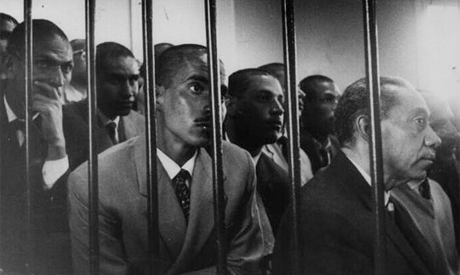
MB Sayed Qotb (right) on trial in 1965
How does Monday's mass death sentence for 529 people fit into the country's modern history of the death penalty?
FACTBOX: A brief history of the death penalty in Egypt
Backed by its constitution, which considers Islamic Sharia its main source of legislation, Egypt is one of 40 countries worldwide not to have abolished capital punishment from its penal code.
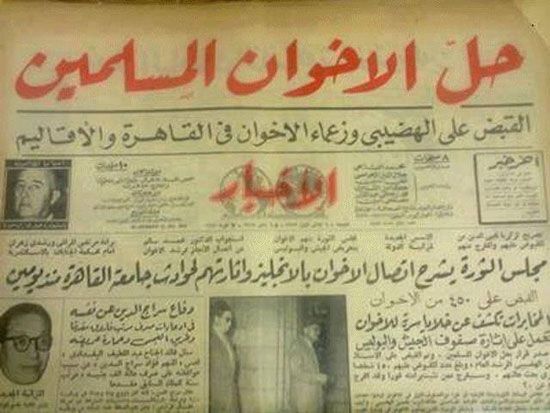

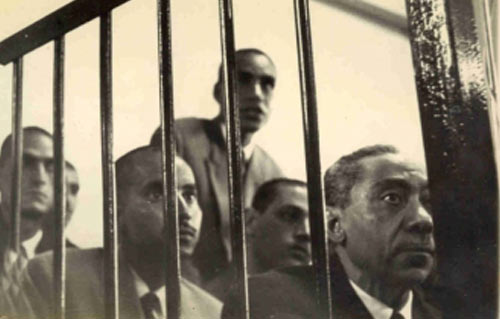
According to local and international reports, at least 709 people were sentenced to death in civilian courts between 1981 and 2000, with only 249 of them reaching execution.
From 1992 to 2001, no less than 94 people were sentenced to death in terrorism-related charges in military and state security courts – at least 67 of whom were executed.
A relative increase in capital punishment became noticeable from 2009 to 2012. In 2010, 136 death sentences were pronounced, though it is unclear how many of them were carried out. At least one of the 115 death sentences from 2011 was implemented. In 2012, 91 people were sentenced to death – how many were executed is unclear, however.


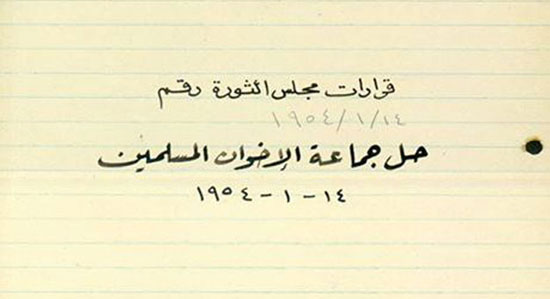

In March 2013, a Port Said criminal court sentenced 21 people to death in connection with the Port Said Stadium killings. In February 2014, the court accepted the appeal and a retrial of the case began.
Capital punishment resurfaced in the news following the violent dispersal of the pro-Muslim Brotherhood sit-ins at Rabaa Al-Adaweya and Nahda Square in August 2013. When violence spread across the country after the dispersal, public figures argued that the death penalty was a necessary tool in Egypt's escalating battle with what the government has labeled terrorists.

There are no official numbers about death sentences handed out in 2013.

Earlier in March, a Cairo criminal court sentenced 26 defendants to death in a terrorism case known in the media as the "Suez Canal cell," a trial that dates back to 2010.
The defendants were tried in absentia on charges including planning attacks on ships passing through the Suez Canal, manufacturing missiles and explosives to carry out attacks, monitoring and planning to attack security targets along with possession of guns, automatic rifles, explosives and ammunition.
The 26 defendants were charged with planning attacks on the Suez Canal, but were released due to lack of evidence. They were then referred to court in November 2013.

On Monday, a Minya court sentenced 529 people to death over the murder of a police officer in what is considered the biggest mass death sentence in the history of the Egyptian criminal court.

In 1954, following a failed assassination attempt on President Gamal Abdel-Nasser in Alexandria, seven leading Brotherhood members including the group's guide Hassan El-Houdaiby were sentenced to death. The sentence was later reduced for El-Houdaiby, who was eventually released. In 1964, Nasser's regime launched a huge campaign against the Brotherhood and arrested a great number of its leaders and members, including the influential Islamist thinker Sayed Qotb.
Qotb and other five other leading members were sentenced to death for plotting to assassinate Nasser. They were executed in 1966.
In 1982, five members of the radical Islamic Jihad movement including Khaled El-Islamboly received the death sentence for the assassination of president Anwar Sadat. The sentence was carried out in April 1982.

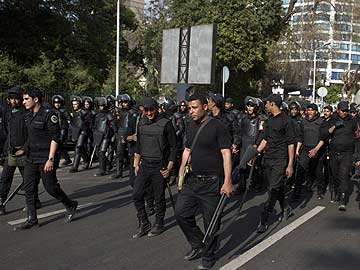
No comments:
Post a Comment
Note: Only a member of this blog may post a comment.